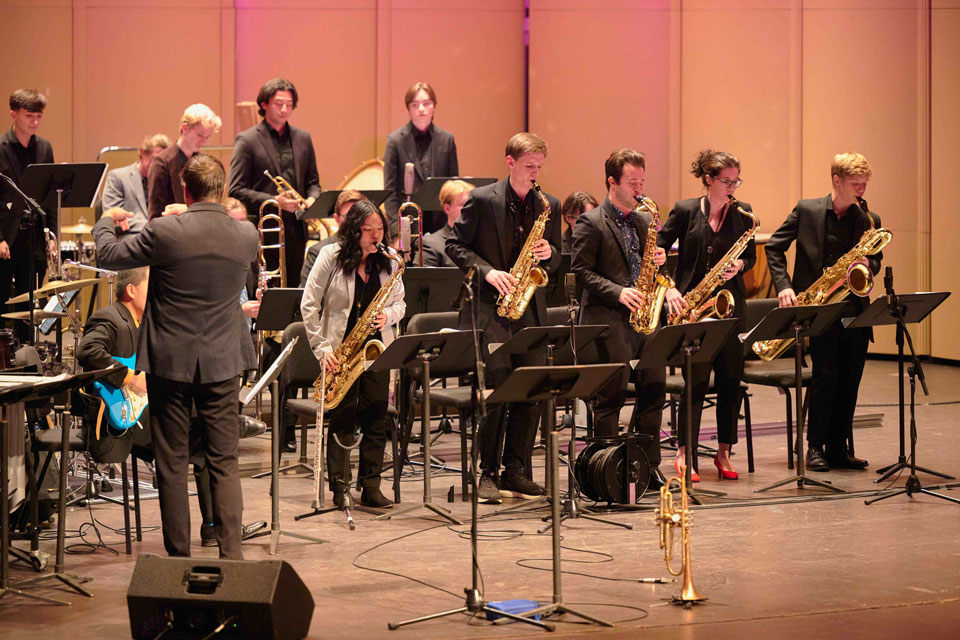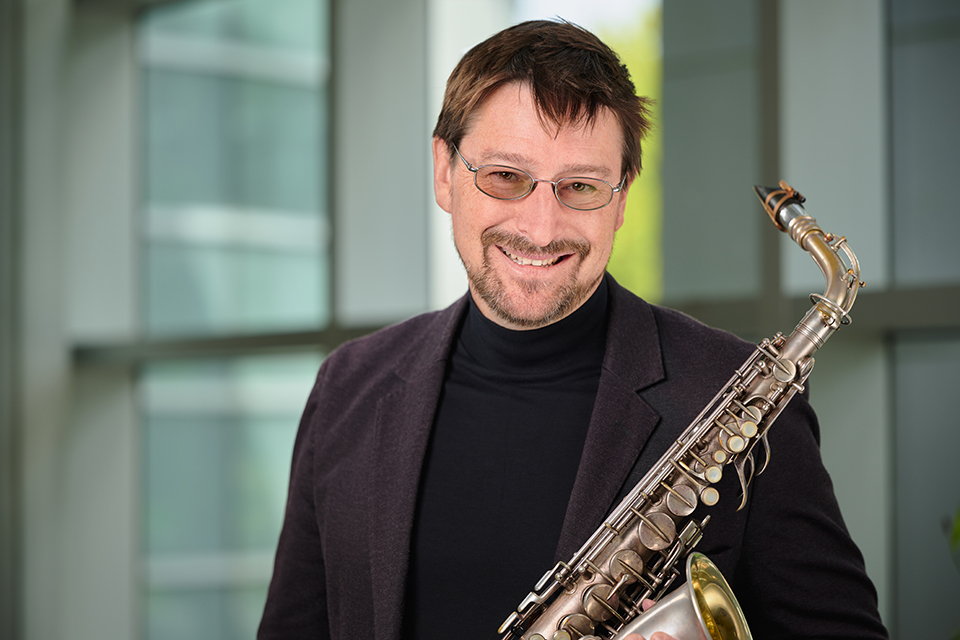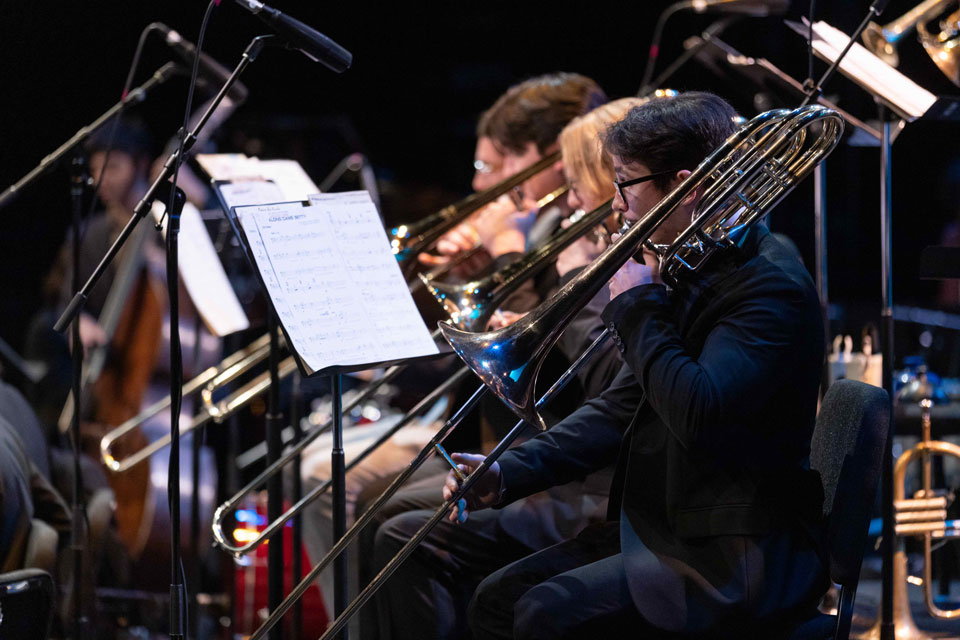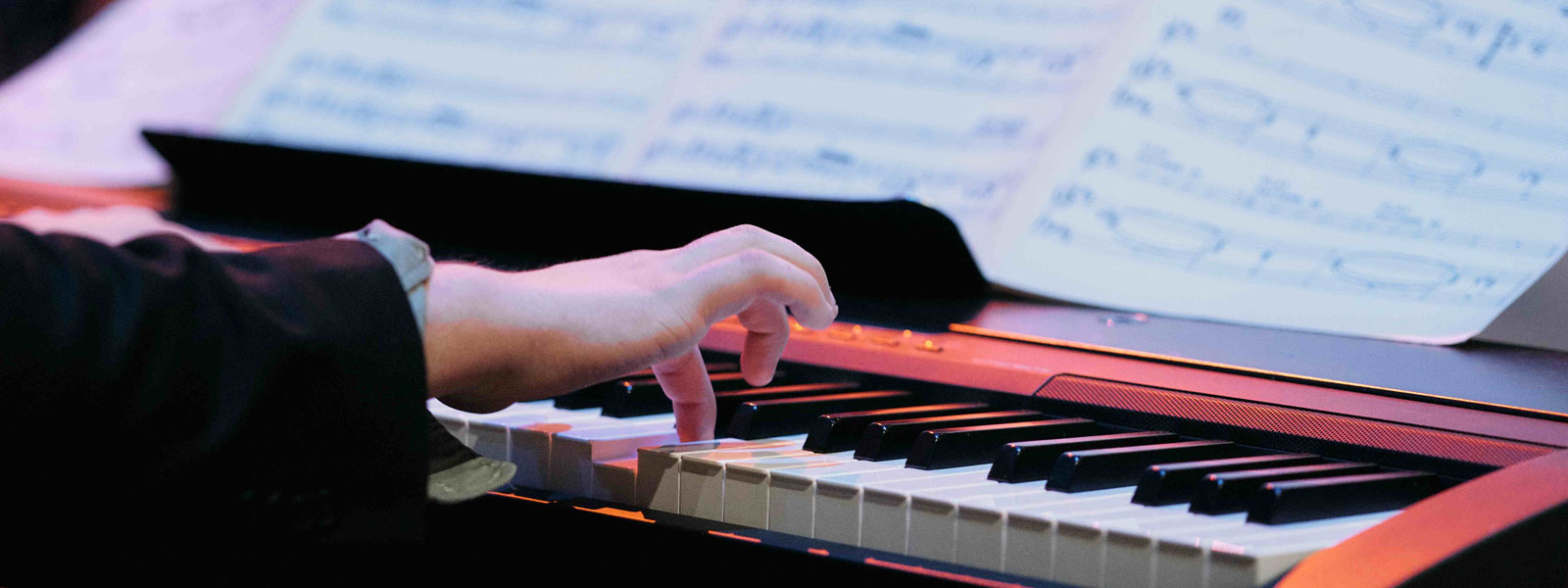UNCSA School of Music presents Jazz Ensemble in first Improvised Music and Jazz Spring Mini-Fest at the Millennium Center
The School of Music at UNCSA presents the first Improvised Music and Jazz Spring Mini-Fest at the Millennium Center in downtown Winston-Salem.
The performance, which will focus on improvisation — one of the defining elements of jazz — will feature slices of musical styles from across the jazz world: big band dance music, small group combo jazz, and a modern professional quintet.
The event will take place beginning at 5:30 p.m. Tuesday, March 26, in the lower level of the Millennium Center, 101 W. Fifth St. Tickets are $25 for adults and $20 for non-UNCSA students with valid ID at online or by calling the box office at 336-721-1945. Refreshments are available.

Steve Alford directs the UNCSA Jazz Ensemble / Photo: Wayne Reich
The acclaimed UNCSA Jazz Ensemble will kick off the evening at 6 p.m., playing a set of big band dance music in the center’s Speakeasy Room, complete with plenty of space for swing dancers of all skill levels to kick up their heels. At 7:15 p.m., four UNCSA Spring Jazz Combos perform jazz standards on multiple stages in the center’s Jazz Club and Red Room, featuring a variety of small-group instrumentations.
At 8:30 p.m., everyone reconvenes in the Speakeasy room for an all-star lineup of visiting artists playing modern jazz quintet at its finest: Justin Ray, trumpet; Jacob Rodriguez, saxophone; Alex Taub, piano; Matt Rybicki, double bass; and Alan Hall, drums.
The Mini-Fest is the brainchild of Steve Alford, the School of Music’s new jazz and contemporary department chair who came to the school last August.
He said that he was drawn to UNCSA for the opportunity to work in a conservatory school: “The artistic depth at this university is amazing – both students and faculty.”
Alford said that an important goal of his department is to provide the students with not only strong technical training but also jazzier, more real-life situations when performing.

Steve Alford
“I want the program going forward to provide experiences that are more in line with the real world,” he said. “The idea is to simulate that for the students and get them to have it before they leave school. I’m not interested in a synthetic music experience. I want a more community-engaged focus. I want the students to experience the life outside the walls.”
The March 26 concert will illustrate that concept, and to ensure and broaden that experience, Alford has also initiated a weekly public workshop on Sundays from 1-4 p.m. at East of Texas on 907 S. Broad St. A professional rhythm section of piano, bass and drums provide opportunities for students and community members to sit in.
“We post the set list and keys in advance, so students and the public can participate,” he said. “It’s a wonderful resource for our students. It’s the way the art form develops. It’s vital.
“To me, artistry is not just the performer and the performance. Artistry is that buzz between the audience and the artist. I don’t see the artist as a pedestal figure who is doing the art and allowing the audience to just see and hear. The audience is as much a creator as the artists are,” Alford continued. I want to see art created in the city and the school being a catalyst for that. Improvisation and jazz are amazing vehicles for that.”

The UNCSA Jazz Ensemble Performs / Photo: Evan Vorhis
No photography or recording is allowed at the workshops. “It provides a safe space for experimentation in music,” Alford said. “People can sit and listen. You’ll see students sitting around the drummer. It’s like a live master class.”
More about Steve Alford
A multi-instrumentalist specializing in the performance and education of contemporary improvisational music, Steve Alford spent multiple years on the road across the United States and Europe. He began his career as a saxophone graduate of the studio music and jazz program at the Frost School of Music at the University of Miami in the mid-1990s. He settled in Chicago in the late ’90s and began pursuing an in-depth study of harmony clarinets, appearing regularly on both saxophone and bass clarinet in the straight-ahead jazz, modern improvised music and experimental indie-rock scenes across the Midwest.
Relocating to Asheville after a decade in Illinois, Alford was serving as an adjunct professor of jazz and contemporary music at the University of North Carolina-Asheville while he completed his master’s degree in jazz at the University of Tennessee in Knoxville.
Concurrently he developed a new contemporary music pedagogy focusing on multilateral ear training, multi-instrumental rhythm section methods class, "mind's ear" sonic exploration and melodic immersion. “It is an active training process that quickly teaches students how their instrument interacts with all of the other members of a small group,” Alford said. “The ‘mind’s ear’ is an auditory take of the mind’s eye. My pedagogy in improvised music takes a linguistic approach. Any noise they create on their instrument is actively grounded into the construction and control of sound intuitively understood by all humans: the voice. All music, like language, is simply a refinement of the first cries, screams and laughs we make as children, and improvised music should be learned like children learn language – no fear, constant experimentation, with a complete license to try. There is no ‘wrong’ way to improvise, and students should constantly experiment and assess their sound, not focus on right vs. wrong.”
During a brief return to the northern Midwest United States, he took over as coordinator for jazz and contemporary improvisation studies at the University of Minnesota Morris, bringing his curriculum of modern multi-genre improvisation study grounded in traditional jazz roots to that university system.
During the past decade, Alford has composed, produced and recorded his most adventurous music to date including his acclaimed 11-piece modern big band, the multi-genre improvisation-based collective known as Rational Discourse; the E.Normus Trio, an alto clarinet, N/S Stick and drums trio within the punk-jazz genre; his quintet METAL, composed of two trash can drum systems, two double bassists, and Alford on electrified contra-alto clarinet and electrified English horn; and his new standards jazz trio and quartets, each reimagining small group jazz through an open and free approach to harmony while remaining grounded in tradition.
Get the best news, performance and alumni stories from UNCSA.
SUBSCRIBE TO OUR NEWSLETTERS(OPENS IN NEW TAB)(OPENS IN NEW TAB)(OPENS IN NEW TAB)(OPENS IN NEW TAB)(OPENS IN NEW TAB)(OPENS IN NEW TAB)(OPENS IN NEW TAB)(OPENS IN NEW TAB)(OPENS IN NEW TAB)(OPENS IN NEW TAB)
March 06, 2024






